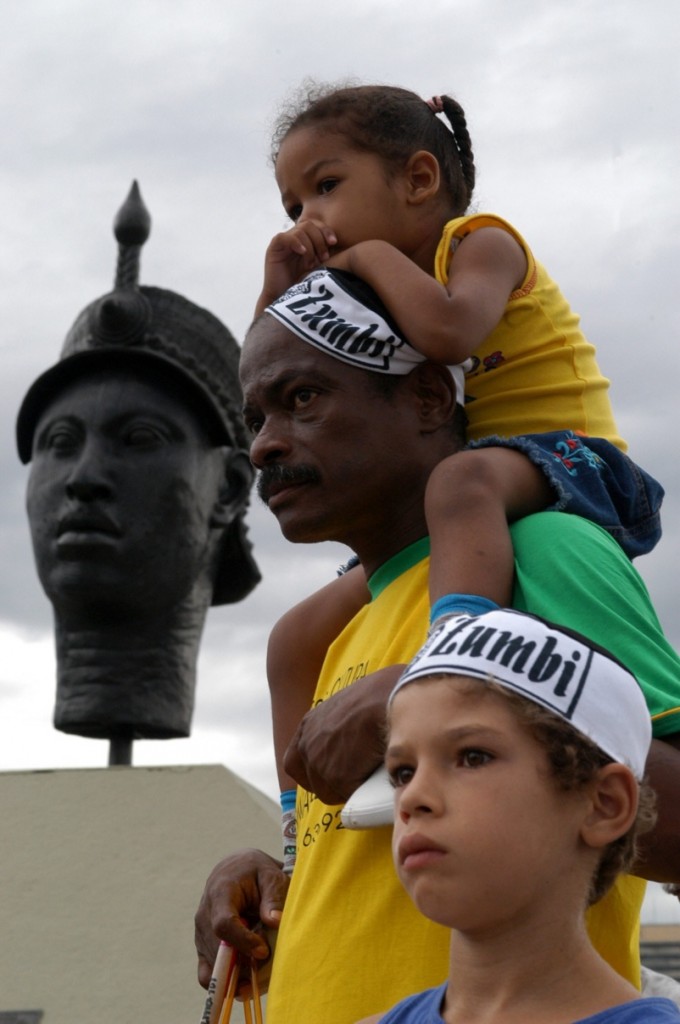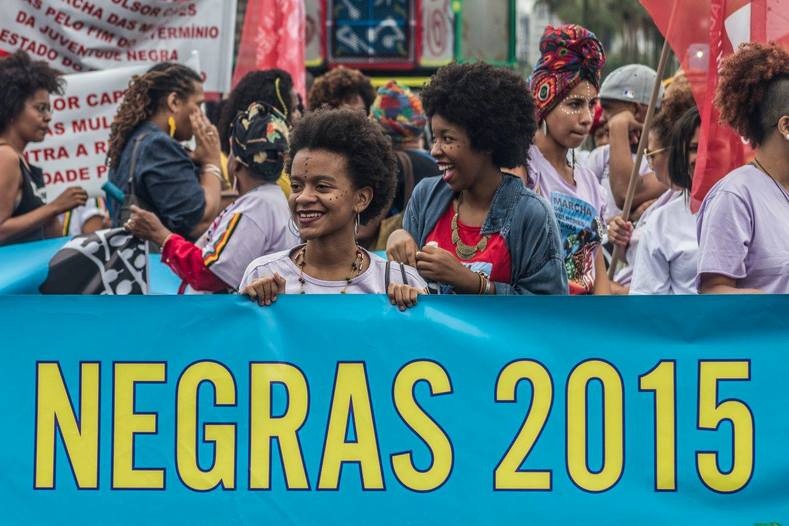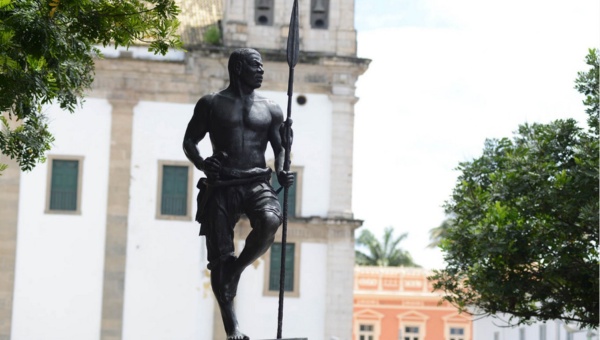National Day
of Zumbi:
Awakening
Black Consciousness
in Brazil
By: Davi Nunes
Nov. 20 celebrates the life of the
Afro-Brazilian resistance leader
while reaffirming Brazil’s position
as the first place of freedom
of Blacks in the Americas.
Today is the National Day of Zumbi and Black Consciousness in Brazil. The celebration is the result of over 40 years of struggle of the renewed Brazilian Black movement.
Celebrated on the 20th of November, the holiday was established officially by Law No. 12,519 on November 10, 2011, and sanctioned by President Dilma Rousseff. This affirmed the history of Black people in Brazil, while commemorating the life of one of their most brilliant military leaders, Zumbi dos Palmares, who died on Nov. 20, 1695.
Zumbi: Black Brazil’s Legendary History of Resistance
Zumbi dos Palmares was the leader of the independent settlement, Quilombo of Palmares – located between the states of Alagoas and Pernambuco, in northeastern Brazil, which was founded by early Brazilian Africans as a resistance to European colonizers and slavers.
The Quilombo Of Palmares can therefore be considered one of the the first places, in the Americas, where Black people, who were brought to the New World enslaved, found freedom. Here they bravely fought against enslavement for almost a hundred years as the Portuguese attempted to colonize Brazil.
The Quilombo emerged in the late sixteenth century and peaked in the second half of the seventeenth century. During this time, resistance to the current slave order was only possible because of adept organizational, military and architectural skills: the Quilombo was surrounded by a high fence made of clay, and palm trees. It had three entrances protected by at least two hundred warriors, who possessed weapons and ammunition, and managed to defeat the expeditions of the colonial government several times, which sought to destroy the Republic of Palmares and the freedom it embodied.
Zumbi, born in the Quilombo in 1655, was kidnapped as a child by soldiers and given to a priest by the name of Father Antonio Melo. He was baptized with the name Francisco and taught Portuguese and Latin. In the year 1670, at only fifteen years old, he resisted the white settlers who he lived among, fleeing from the parish to return to his original home in the Quilombo.
Watch: Clips from the movie 1984 movie Quilombo featuring Afro-Brazilian actress
Zezé Motta and the music iconic Gilberto Gil.
After the death of the powerful leader Ganga Zumba, Zumbi became the absolute leader and military strategist in the fight against slavery. It was said that he held great spiritual power and that African ancestors of Brazilians protected him.
He defied several European settler military expeditions, ultimately prompting the king of Portugal at the time to write Zumbi a letter urging him to agree to surrender and live under the Portuguese laws. But Zumbi was no assimilationist. Refusing to accept life under the yoke of the Portuguese crown, and wanting full freedom for his people to the end Zumbi was killed in battle on November 20, 1695, after resisting, and fighting military expeditions.
An Awakening of Consciousness
For the African-Brazilian, November 20th is now celebrates the life of a hero who died fighting for freedom. It is a radical action that affirms the history of Black struggle against colonialism with its own national holiday and is a symbol of progress for Brazil.
On the National Day of Zumbi and Black Consciousness and throughout November marches take place throughout Brazil, though depending on the region, the actual activities of the day may differ. Recently the common theme of the marches is about stopping the genocide against Black youth and empowerment for Black Women.

Brazilians in front of statue of the fugitive slave resistance leader Zumbi dos Palmares, in Rio de Janeiro, who led a rebellion against the European colonizers slavery system during the colonial period. Zumbi’s death is commemorated today in Brazil as the Day of Black Consciousness. EFE/Marcelo Sayão
Earlier this month, on Nov. 7 was the March of Natural Hair Empowerment in the city of Salvador, Bahia. The march gathered a large crowd, mostly women, whose aim was to promote the affirmation of the Black beauty, especially kinky, and curly hair which is a political and cultural expression of ancestry. However, in Brazil this expression hasn’t always been accepted. Historically it has been stifled through the use of chemical straighteners and straightening combs. But, this march was a space for Afro-Brazilians to come together and affirm each other’s beauty in the fight against racism in Brazil.
On November 18th there was the National March of Black Women in Brasilia. 20,000 women of all states and regions of the country marched for freedom, a fair and democratic country and a stronger sense of safety as some reports say that almost every two hours a Black Woman in Brazil dies from causes other than natural death.
Now, during the month of November, especially after the implementation of the law 10,639 in 2003, which made the teaching of history and African and Afro-Brazilian culture in elementary schools and high school compulsory, many events related to appreciating Blackness happen.
But the big problem is that this only occurs during that small space of time, and during the other time of the year, black history and culture are neglected, made invisible in a country that, despite their diversity, presents white as the universal standard.
However, the 20th of November signifies a victory for a generation of intellectuals in the Black movement who competed in the historical memory and won. They challenged the official historiography of slavery told by descendants of Europeans (a paternalistic story of white princess who freed the slaves by a simple decree) and erected a Black hero to represent the historic fight of more than half of Brazil’s population, which has historically been subjugated.
In Brazil, because the mass media is a vehicle where the white elite project their ideologies and exert mental control over much of the population, black leaders like Zumbi are usually purposely neglected in academia and by the state. Brazilian racism works to silence and delete Black voices and stories. So even though much of the population is stuck in psychological shackles, many are becoming empowered by the knowledge of the ancestors. They are marching in the streets and beginning to constitute what may be called own will to be free from mental prison.
The 20th of November is a constant reminder to Brazilians to keep fighting for our freedom. And it is for this purpose that the streets are filled, the flags and portraits of Zumbi are held and waved. As the traditional drums are played: the force of Zumbi extends to every person in the Americas who seek to fight for equality.
PHOTO GALLERY: Black Women March Against Violence in Brazil

Many social organizations participated in the march, including the labor union CUT. Photo:Vinícius Carvalho / Jornalistas Livres
The Republic of Palmares, is very important for the African-Brazilian, and especially for any Black person in the Americas, because it was the place where freedom for the enslaved African was won, even before the Haitian Revolution.
In a way the Quilombo of Palmares, is where Africa had reinvented itself for nearly a century. Palmares is a spirit, the fire that burns in the chest in search of justice. This memory is revived during the National Day of Zumbi and Black Consciousness in Brazil, and advances the struggle for socio-racial equality, for full freedom, which is longed for constantly by Blacks throughout the world, from Africa to its diaspora in Americas.
++++++++++++
Davi Nunes, is a native of Salvador-Bahia,Brazil. He is a Black Brazilian writer and poet. You can following him here https://ungareia.wordpress.com/davi-nunes/


